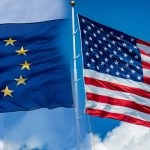To counter China, the US should encourage AI proliferation — and set the terms for global growth.
Looking to stay ahead of China, the United States cannot afford to leave its closest friends behind. It’s a lesson that the Trump administration seems eager to learn from, as it replaces the Biden administration’s Framework for AI Diffusion—a series of export controls aimed at protecting American innovation, which ultimately calcified into a set of restrictions affecting Warsaw and Wuhan alike.
Viewing AI as a key battleground in a larger rivalry with Beijing, the Trump administration has an opportunity to enlist US allies and partners in the fight on an equal footing. In selectively relaxing export restrictions on key technologies, Washington can ensure that the future of AI innovation occurs within a walled garden, encouraging proliferation while stymying China’s technological rise.
China’s AI Strategy Threatens US Technological Leadership
China’s advances in AI have laid the groundwork for Beijing to bolster its economic and military prowess while simultaneously accelerating the global AI market. Having poured subsidies into its entire AI supply chain — from research and development to chip manufacturers and national champions — the country boasts a growing AI industry that can contribute to scientific advancements, industrial retooling, and combat readiness.
Along with bolstering the Chinese Communist Party’s standing at home, Chinese AI firms remain poised to gain ground abroad — and lock out the United States in the process. Beijing’s support for open-source development, coupled with Chinese firms’ technical prowess, has produced a series of low-cost, high-quality models capable of competing with Western proprietary systems. These models threaten to expand China’s market share, displacing the United States to become the foundational architecture for global AI development.
Washington Should Encourage AI Innovation Among Trusted Partners
Washington must expand its reach within the global AI market to construct a lasting global coalition to confront Beijing. This commitment to diffusion will require the United States to allow private firms to share their technical prowess with the nation’s closest allies and partners, allowing both public institutions and private companies to freely purchase crucial components for their indigenous AI industries.
This effort will allow Washington to reap the best innovations of its most technically savvy allies and partners, a form of responsible burden-sharing that will benefit the US twice over. In loosening export controls, Washington can invest in the AI innovation pioneered under fire by Ukraine and Israel, both of which currently face limitations on their purchases of US AI components. Allowing both Kyiv and Jerusalem to freely acquire the resources necessary to nurture world-class defense startups, many of which work on crucial technologies such as drones and precision targeting, is a no-cost investment in US national security. Moreover, as Washington looks to rebuild its own atrophying defense industrial base, these same investments will also feed a pipeline that has already paid significant dividends to American industry in the form of strategic partnerships and mergers.
The US Must Secure the AI Supply Chain Without Isolating Itself
The leverage offered by Washington’s commitment to diffusion will also be key in constructing a global coalition committed to confronting China’s burgeoning AI sector. In exchange for access to crucial AI components, the Bureau of Industry and Security (BIS) should impose strict security requirements on potential buyers, cutting off all possible avenues for Beijing to steal American technology via third-country transactions.
These measures should encompass all aspects of the AI development pipeline, from initial funding to mass deployment. Seeking to circumvent US export controls, Beijing has systemically invested in its capacity to source key AI components from abroad — funding research laboratories, supporting emerging firms, and smuggling components from neighboring countries.
To catch up, BIS must ensure that access to American technologies is contingent on interested countries and companies implementing stringent security measures. These should include mechanisms to screen foreign investment into strategic sectors such as AI development, including private funding for academic laboratories conducting AI research. BIS should also require countries seeking to gain access to AI components to align their export controls with those of the United States, particularly within the realm of dual-use technologies such as high-end graphic processing units and lithography machines. Along with protecting key components from Beijing’s commercial espionage campaigns, these measures will bolster Washington’s efforts to regulate emerging technologies, building a durable model to control proliferation.
While Washington remains ahead on AI, Beijing is increasingly able to compete with its state-backed facsimile of America’s AI innovation pipeline. Staying ahead will require the United States to enlist its unsurpassed network of allies and partners as a true force multiplier, rather than treating them as a security risk.
About the Author: Jack Burnham
Jack Burnham is a research analyst in the China Program at the Foundation for Defense of Democracies (FDD). For more analysis from Jack and FDD, please subscribe HERE. Follow Jack on X @JackBurnham802. Follow FDD on X @FDD. FDD is a Washington, DC-based, nonpartisan research institute focusing on national security and foreign policy.
Image: Shutterstock
















